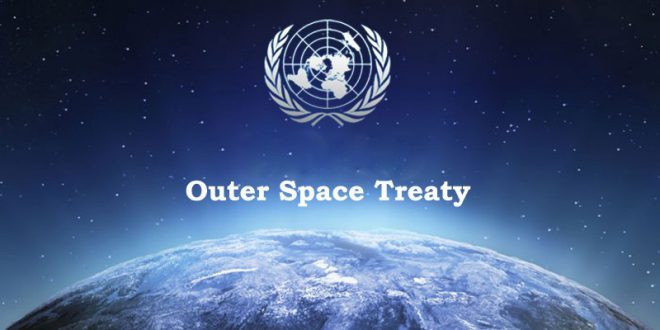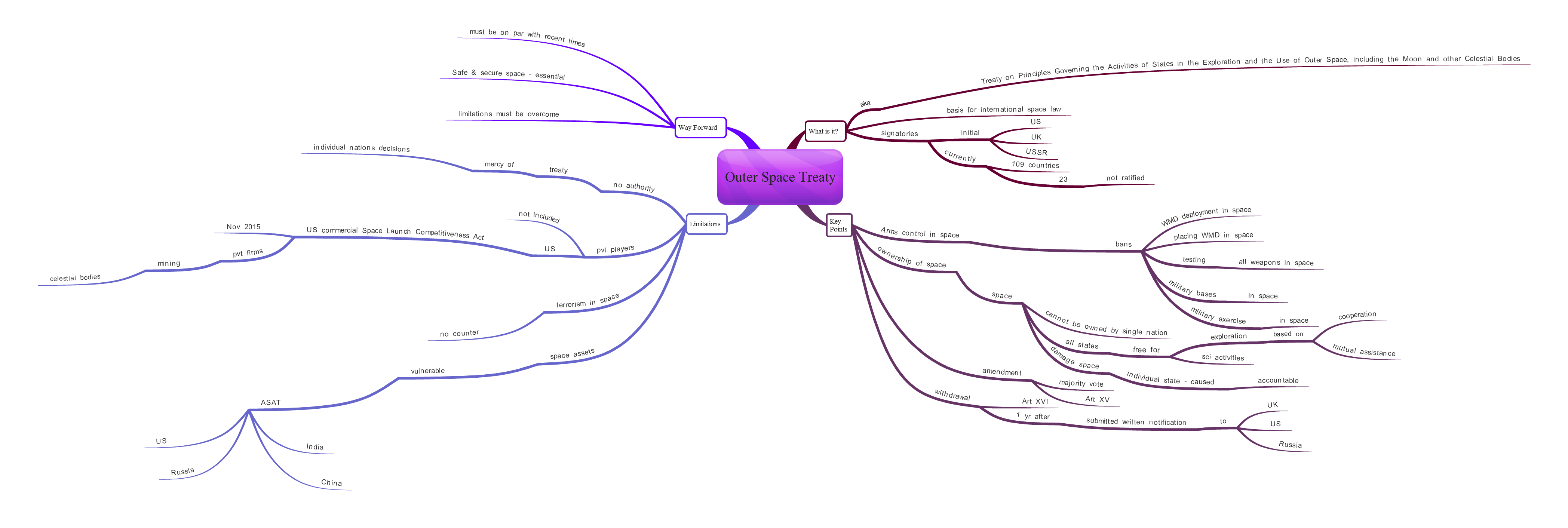The Outer Space Treaty & the Weaponization of Space

From Current Affairs Notes for UPSC » Editorials & In-depths » This topic
IAS EXPRESS Vs UPSC Prelims 2024: 85+ questions reflected
Presently, we are at an era that sees increased human influence that extends beyond the Earth’s atmosphere. Even our daily actions are under the influence of the technologies that exist in outer space. This includes our daily telecommunications, favourite TV shows, etc. They are under the influence of the satellites that exist in the outer space.
Notably, on 2005, an Indian claimed that he had purchased a 5 acre land on the moon for $140 (Rs. 9959) through the US-based website LunarRegistry. Many others like him have claimed ownership of land on the moon. But can they legally claim land on the moon or any other celestial bodies in space? The answer is that it may not be possible because it is explicitly stated in the Outer Space Treaty that no one can claim ownership of the moon or any other celestial body.
What is the Outer Space Treaty?
- The Outer Space Treaty was formally known as “Treaty on Principles Governing the Activities of States in the Exploration and the Use of Outer Space, including the Moon and other Celestial Bodies”.
- This treaty formed the basis for the International Space Law.
- It was initially signed between the US, UK and the former USSR on January 27, 1967, and it came to effect on October 10, 1967.
- As of now, 109 countries are the parties of this treaty.
- 23 countries have signed but have not ratified it.
What are the key points of this treaty?
Arms control in Space:
- The treaty bans all states from deploying nuclear weapon or any other weapons of mass destruction into the outer space.
- Though the weapons of mass destruction are not specifically defined in the treaty, it is well known that the WMDs include the nuclear, biological and chemical weapons as they have highly destructive and devastating force.
- However, this treaty does not specifically ban the launching of the ballistic missiles which has the potential to carry WMD warheads.
- The nations are not allowed to place objects that may contain any nuclear weapons or any other weapons of mass destructions on the orbit of Earth and other celestial bodies in space.
- The countries are forbidden from placing WMD on the celestial bodies or the outer space in any other possible means.
- The signatories are prohibited from instituting military bases, testing “any type of weapons” or conducting military exercises on the moon and other celestial bodies.
Ownership of Space:
- According to this treaty, space is a “common heritage of mankind”.
- Therefore, all countries are free to undertake exploration and scientific activities in space.
- The outer space and its celestial bodies cannot be owned by any single nation.
- Space exploration must be based on the principle of cooperation and mutual assistance.
- Also, any country which causes any form of damage in space is liable and accountable to the international community.
- All countries must avoid contamination of space or celestial bodies.
Provisions for amendment:
- As per the Article XV of the Outer Space Treaty, the members are allowed to make suggestions or propositions on amendments.
- The suggested amendments are put to force only if the majority of the signatories accept it.
Provisions to withdraw:
- Article XVI of the Outer Space Treaty talks about the signatories’ withdrawal procedures.
- The member state can withdraw from this treaty a year after it has submitted a written notification of its intentions to the depositary states – the US, UK, and Russia.
What are the limitations of this treaty?
Does not include private players:
- Currently, the influence of private enterprises in the space sector is increasing exponentially.
- This treaty includes only countries and not private individuals. US President Barack Obama had signed US commercial Space Launch Competitiveness Act on November 2015.
- This allows the private firms in the US to mine asteroids and other celestial bodies for commercial purposes.
- This law is by no means against the Outer Space Treaty because the US Government does not own any of the resources exploited in space.
- This increases the potential of the cumulative race for space exploitation.
- Though the treaty specifically states that no sovereign nations can claim appropriation on any of the celestial bodies, it does not include the private individual’s ownership.
The vulnerability of space assets:
- Since the Cold War era, there has been increasing the use of space both for the civilian and military purposes.
- However, these assets remain vulnerable because of the emergence of Anti-Satellite Weapons.
- The US, Russia, China, and India are the only countries who have the capacity to utilize this space weapon as of now.
- The latest to enter into this group is India when it announced its first ASAT test under the operation that was codenamed Mission Shakti.
- The treaty does not have any provisions that safeguard the countries’ assets on space.
No provisions to counter space terrorism:
- The current terrorist operations have shown that the terror groups are constantly evolving and are using all the modern means available to achieve their objectives. They are using social media, drones, etc., to spread their ideologies.
- With the increasing role of private players in the space sector, space is vulnerable to being used by terrorists.
- Therefore it is essential to include counter-terrorism activities in space to prevent future threats that may arise within the outer space.
Lacks authority:
- Like all the International laws, this treaty is also under the mercy of the individual decisions of the nations.
- There aren’t any binding forces that can stop any country from violating the treaty. As it has been proven many times, international sanctions do little to stop the existing threats that affect international politics.
Way Forward:
- This treaty has numerous limitations and loopholes that are not on par with the current scenario.
- The international community must take action to ensure that appropriate measures are taken for a safe and secure space as it plays a very vital role in the economic growth and the security of the countries across the world.
Article by: K.G.Karishma
If you like this post, please share your feedback in the comments section below so that we will upload more posts like this.


